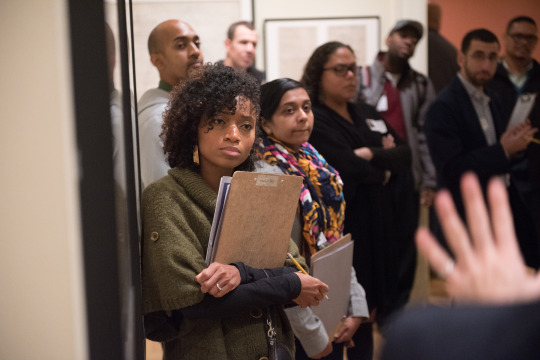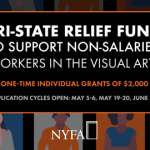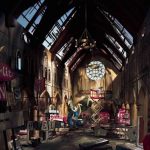Gaining a Competitive Edge in the Museum Field
Learn how the online MA in Museum Studies at CUNY SPS can help you get ahead on your own terms in our latest #NYFAPartner spotlight.
As a result of the COVID-19 pandemic, the United States has collectively pivoted towards online platforms to conduct business and stay connected and informed. Prior to the crisis, however, there was a growing trend in online education as a way for individuals to gain new knowledge and a competitive edge in a diverse range of industries while balancing other life priorities. We recently spoke with three current students in the online Master of Arts in Museum Studies program at the CUNY School of Professional Studies to learn how they are building community through a first-class education, and how the program is setting them up for success in the museum field after graduation. We also gained insights from Jenna Coplin, Program Manager of the Museum Studies program.
Before museum administrator Jinelle Thompson started the MA in Museum Studies degree program in 2019, she had concerns about whether an online program would enable her to make connections with students, faculty, and practitioners in the field. She’s since found that the “discussions in this program are rich, and my colleagues are often providing insightful and compelling responses to each topic we learn.” The MA in Museum Studies program, which was developed in collaboration with the New-York Historical Society (N-YHS), offers practical assignments that introduce students to specific roles within museum settings and provide a strong foundation for a museum career. Thompson also noted that learning from professors and guest lecturers who work in museums provides both a current look at what’s happening in the field and gives insights into their unique career trajectories. Thompson, who wants to pursue museum work in public programs, education, and community outreach/engagement with an interest in amplifying artists from the Caribbean diaspora, recommends the program for its flexibility and its comprehensiveness: “It’s definitely still a lot of work, but the flexibility that I have and being able to still work is the best part of it for me. Through each class, I am learning the best practices and the ins and outs of museum education, finance, development, and curation and how these departments work alone and together.“
Second-term student Rachel Pitkin, who already holds one master’s degree, has found that she interacts “just as much if not more with my classmates—intellectually speaking, at least” than in the smaller, seminar-style classes she was accustomed to from her past in-person educational experience. “Because our interactions revolve around very pointed questions related to the course, our engagements are very specific and thought-provoking,” she added. Like Thompson, she’s also benefited from the N-YHS partnership: “Our professors are incredibly knowledgeable and invested in the program, and it shows through their course design and online interactions with us.” Pitkin applied to the Museum Studies program with the goal of contributing to LGBTQ-oriented institutions, and has been able to design her individual projects around this focus. A current exhibition project at the LGBT National History Archives, where she has researched and volunteered regularly, underscores how the program is helping to support her previously-established professional work as an educator and historian.
Museum administrator John Sapida, who also started the program in 2019, set out with the goal of becoming a more well-rounded museum professional who can help shape the direction of in-person, blended, and online learning for museums. “Museums are changing with the times, and we need to find opportunities to help scaffold museums along the right path,” he said. Sapida finds the program helps him balance work, life, school, and hobbies, and pushes him to do his best. “Weekly discussions with other students, professionals, and instructors are often the highlight of the courses. As we share our knowledge and experiences with each other, I am finding that my peers in the program play a huge part in pushing my own limits and exercising my own creative and critical thinking about the topics we are covering.”
Those not in New York City still form connections through clear and consistent communication in the online learning environment, said Jenna Coplin. “Students can contact faculty to directly schedule meetings during their weekly office hours. Meetings can be one-on-one or in groups and may be conducted remotely using video chat, for example.” Three of five required courses have a practicum component that is designed to engage students in the experience of doing museum work; students participating remotely can view the events via livestream from anywhere they have internet access. The video recordings from each practicum session are archived for those who are unable to attend, and courses build on materials from the practicum throughout the semester. Courses include curation, technology, and education as well as administration and finance—all geared towards providing students with a broad background on the practical application of museum work and operations. “Students emerging from the program will be prepared to work in a variety of museum-related fields with an eye to the concern for diversity and inclusiveness, something often overlooked in current museum practice,” said Coplin.
Coplin reinforced that almost all current students work, many full-time and with family or other responsibilities. Pitkin expressed confidence in being prepared for what lies ahead: “Because of its rigor, and the ability of most students to multi-manage the demands of the program with the demands of their work, I feel strongly that students in the CUNY SPS program will already have an edge in being able to handle the wide-ranging job demands that museum professionals are expected to be ready for in today’s field. Diversifying the museum field means finding mechanisms to allow a diverse array of people to access preparatory programs, and this program is doing that. ”
Interested in learning more about CUNY’s Master of Arts in Museum Studies program? Register to attend this May 12 online information session. Explore the program’s curriculum, and apply for the Fall 2020 semester by Monday, May 18, 2020.
-Amy Aronoff, Senior Communications Officer
This post is part of a regular blog series highlighting #NYFAPartner sponsor organizations, and the third in our “Get Into Grad School” series on NYFA Current. Follow NYFA on Twitter, Facebook, LinkedIn, and Instagram to see the latest news about each #NYFAPartner. Sign up for NYFA’s bi-weekly newsletter, NYFA News, to receive announcements about future NYFA events and programs.
Images: Courtesy of CUNY SPS and New-York Historical Society





